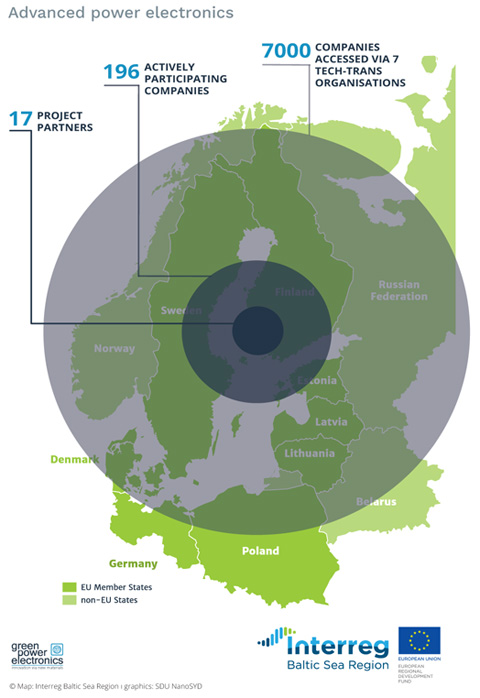 The novel technologies behind advanced power electronics allow for more than 50% in energy savings by reducing energy losses at all stages of the energy supply chain. Next generation large onshore and offshore windmills, large solar power plants as well as virtually all modern electrically driven cars require advanced power electronics to function reliably and efficiently; thus, advanced power electronics is one of the key drivers for the reduction of the CO2 footprint in the Baltic Sea Region and worldwide.
The novel technologies behind advanced power electronics allow for more than 50% in energy savings by reducing energy losses at all stages of the energy supply chain. Next generation large onshore and offshore windmills, large solar power plants as well as virtually all modern electrically driven cars require advanced power electronics to function reliably and efficiently; thus, advanced power electronics is one of the key drivers for the reduction of the CO2 footprint in the Baltic Sea Region and worldwide.
Power Electronics for Green Energy Efficiency (Green PE) is a project that accelerates the market uptake of advanced power electronics by small and medium sized companies in the Baltic Sea Region for conversion, transmission and consumption of energy and thus supports a seamless transition towards a green society which uses clean, secure and efficient energy. The project is built on a cross-sector consortium consisting of seven research institutions, eighteen companies from the energy supply chain as well as seven partners from business development associations, technology transfer institutions and cluster organisations. It is led by the Mads Clausen Institute of the University of Southern Denmark.
As one major milestone in the project, a technology and product roadmap with regional specialisation has been developed and spread across the Baltic Sea Region via dedicated matchmaking measures. To proceed from road mapping to applications, the project carries out showcases in some of the most relevant energy sectors for the region, namely renewable energies, e-mobility and low-energy smart buildings. The showcases directly involve companies and research institutions. Within renewable energies, the utilisation of new sources for renewable energies (large scale photovoltaics, offshore wind and large-scale bioenergy) requires radical changes in the power electronics modules on the element (e.g., transistor) level. For the realisation of e-mobility as an alternative to conventional car technology, a radical new concept of car electronics, electrics and control is required, asking for power train-integrated advanced power electronics components. Finally, within the smart efficient building sector, new energy efficiency solutions require user participation, active feedback control and sophisticated (e.g., window- or wall-integrated) power modules.
The Green PE project has an intense focus on building strong relationships between industry and research institutions. This enables companies throughout the Baltic Sea Region to gain the latest knowledge and information within their field, while the research institutes get a chance to create long-lasting relationships and to commercialise their research. This win-win situation leads to a dynamic business and innovation eco system which, in turn, creates jobs and growth in the entire Baltic Sea Region. The strong collaboration with industry is witnessed through the nearly 200 companies that already have actively participated in the project. In addition, the project has activated seven technology transfer partners in the Baltic Sea countries with access to more than 7000 companies in the BSR in total.
Contact information
SDU | Mads Clausen Institute
Website: www.balticgreenpower.eu